 |
|||||
|
|||||
| Preview of Stamps Catalogue: VOLUME 1 |
 |
|||||
|
|||||
| Preview of Stamps Catalogue: VOLUME 1 |
Return To Catalogue - India overview - India 1854 issue
Note: on my website many of the
pictures can not be seen! They are of course present in the catalogue;
contact me if you want to purchase it.
Genuine Four Annas stamps:
This stamp was the first bi-colored stamp in the world. Most
stamps (around 90 %) are cut to shape. The first printing of
these stamps were printed with blue wavy separation lines; the
stamps were placed at a 18 mm distance. The second printing did
not have any separation lines and was printed at a 6 1/2 mm
distance. The third printing also did not have any separation
lines and was printed at a distance of 2 1/2 mm. Specialists
distinguish between the impression of the head of the first
printing (coarser printed head) and the 2nd/3rd printing (finer
printed head). The stamps have a sheet watermark consisting of
the arms of the East India Company.
Reprints exists and were first made in 1867 with
red or blue separation lines without watermark. Other reprints
exist from 1887(?).

I've been told that this is a reprint.
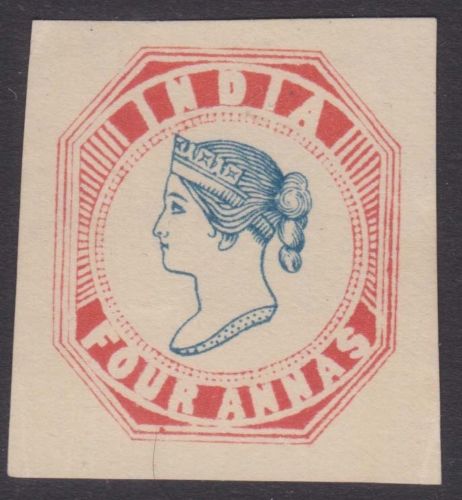
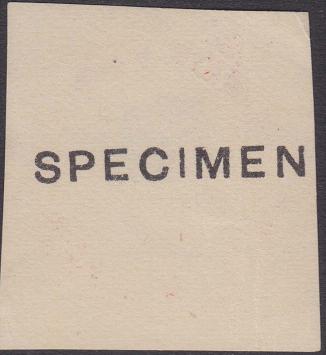
Reprint(?) with "SPECIMEN" printed on the back.
Since there are only 27 genuine stamps with inverted center, the chances of an inverted head stamp being genuine are very slim.
There exist many forgeries of this stamp. Examples of forgeries:

(Reduced size)





The Queen has no mouth and the eyes are 'droopy' in the above
forgeries (the eyebrow is missing!). Also note the very white
patch in the hair. I've seen whole sheets of these forgeries:


These forgeries were printed in whole sheets with "124"
(two types), "A124" or "17" cancels.


The same forgeries with "17", "A124",
"B18" and "158" numeral cancels.
I know that Fournier and Peter Winter (and probably many others) have made forgeries of both the normal and the inverted center stamps.



Modern Peter Winter forgeries, made
somewhere in the 1980's; the same breaks and spots always appear
in the same location in these forgeries. Usualy, the word
"Replik" is printed at the back.

Forged inverted center, genuine stamps should have 21 red bars
left and right; this one has 23 red bars.
Fournier forgeries, as taken from a 'Fournier Album'. Some with 'FAC-SIMILE' printed on the backside (applied by the Philatelic Union of Geneva). I don't know the distinguishing characteristics of these forgeries:


(Fournier forgeries, reduced sizes)

This block of four forgeries was also made by Fournier, however,
it appears to be a different type with a very pointed nose (as
mentioned in the Serrane Guide). The 8th line from the bottom at
the left enters the white circle to the right of it. It exists in
both normal and inverted head variety.

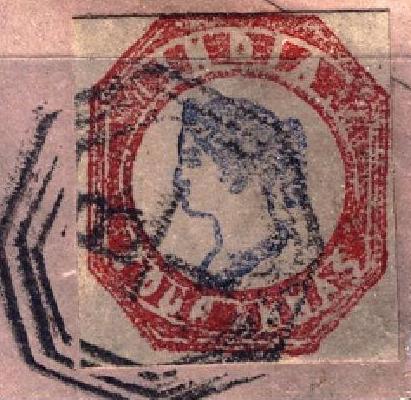



Very blur forgeries. The hair is rounded at the back.


Another forgery with the lettering very badly done.
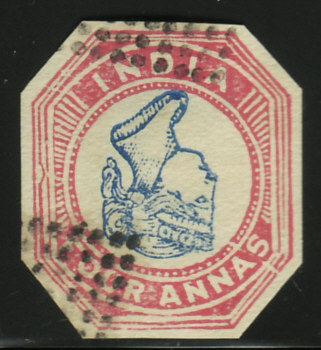



Some forgeries made by the same forger; left inverted head. It is
as if the word "DAD" is written in the crown on the
forehead of the Queen in this forgery. The "D" of India
is too broad in my opinion. The "O" of "FOUR"
is too round. The "D" of "INDIA" is too open.

Forgery with inverted head, possibly from Italian origin. The 'R'
of 'FOUR' is too wide


Forgery with 'R.T' cancel.



Note the open top "D" in "INDIA". The cancels
(on the same sheet!) are "A01" and "118".
Also the "O" of "FOUR" is more open than in
the genuine stamps.

Forgery with very rounded jawline, also note the large inner
space in the "O" of "FOUR".
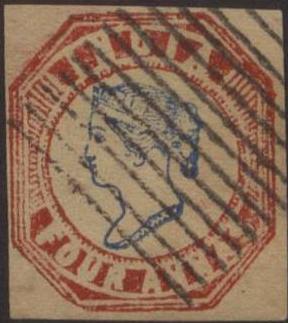

The Queen appears to be smiling in these forgeries. The left
bottom frame is shaved off. The ear is very big.
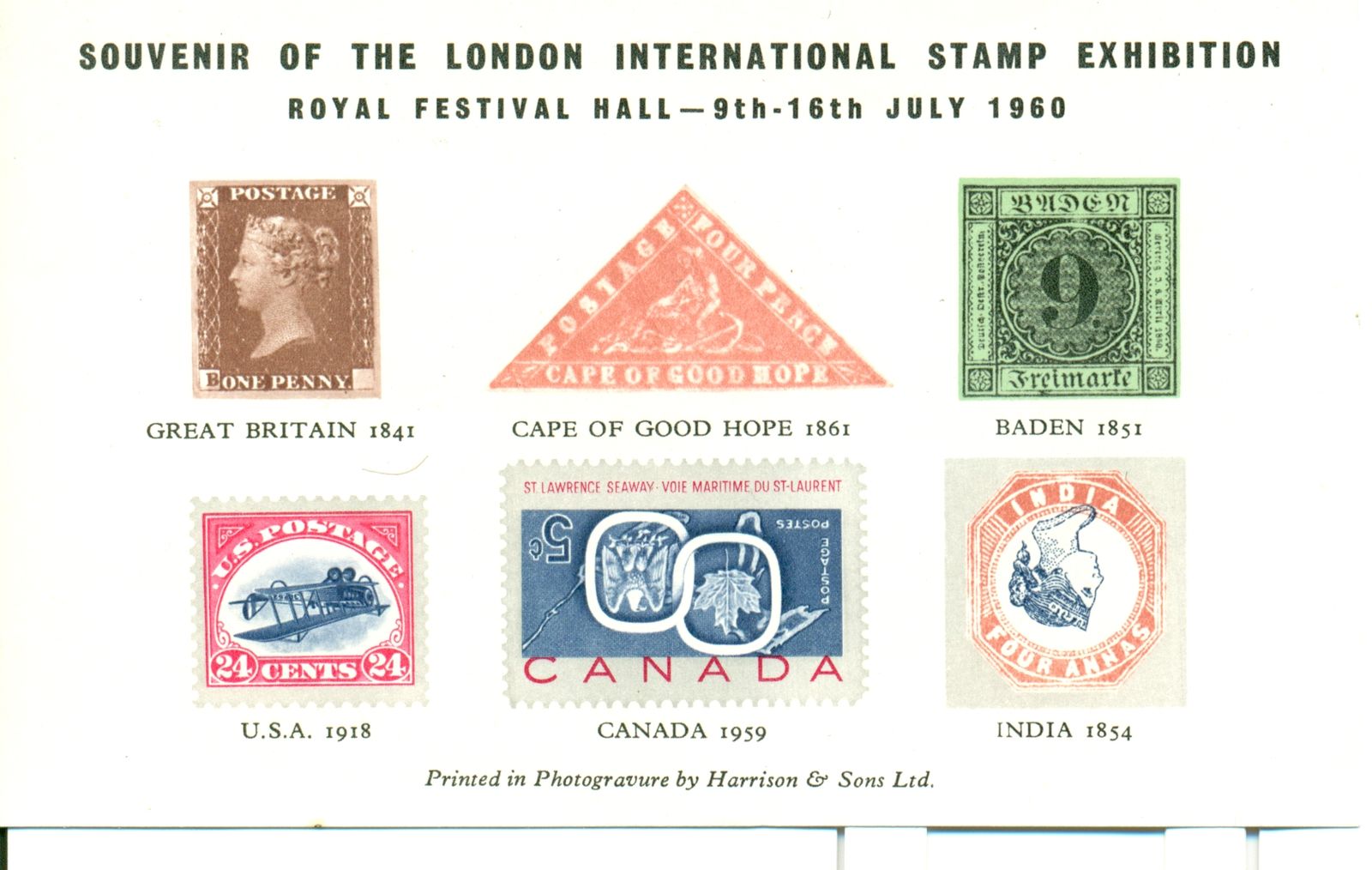
 Souvenir sheet with an inverted 4 a stamp.
Souvenir sheet with an inverted 4 a stamp.
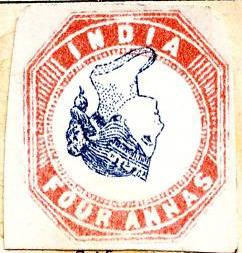
Cut from the above souvenir sheet.
The forgers Treherne and Assmus made forgeries of this stamp (source: "Philatelic Forgers, their Lives and Works" by V.E.Tyler).
Reprints, literature: 'The identification of the Essays, Proofs & Reprints of the 1854 issue of India' by James A. Spence (1975).